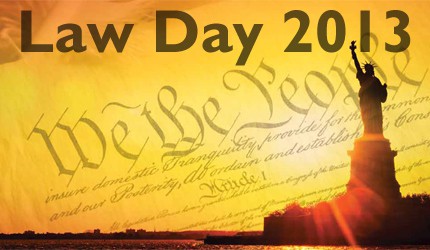Charlene LaVoie
In 1958, the American Bar Association proposed that May 1 be designated as Law Day as the peaceful answer to the traditional May Day military displays in Communist countries, particularly the former Soviet Union. President Eisenhower agreed and thus, the Law Day tradition was born. In 1961, a Congressional resolution pronounced Law Day as a way for Americans to celebrate “a day of national dedication to the principle of government under laws” and as a day of national remembrance of “the great heritage of liberty, justice, and equality under the law.” Every president since has issued a proclamation each year recognizing Law Day, which is seen as a way to demonstrate the difference between the rule of law versus the rule of force.
The Connecticut Bar Association Law Day theme this year is Realizing the Dream: Equality for All.
The promise of equality under the law continues to make the United States a beacon to people. It is a pledge set forth in the Declaration of Independence and in the first words of the Preamble to the Constitution, “We the People.”
It is, in the words of Abraham Lincoln, the proposition to which our nation is dedicated.
The year 2013 marks the 150th anniversary of Lincoln’s issuance of the Emancipation Proclamation, which was an order issued to all segments of the executive branch (including the Army and Navy) on Jan. 1, 1863, during the Civil War. It was based on the president’s constitutional authority as commander in chief of the armed forces; it was not a law passed by Congress. It proclaimed all those enslaved in Confederate territory to be forever free, and ordered the Army (and all segments of the executive branch) to treat as free all those enslaved in 10 states that were still in rebellion, thus applying to 3.1 million of the 4 million slaves in the United States.
2013 is also the 50th anniversary of the march on Washington and the Rev. Dr. Martin Luther King’s “I Have a Dream” speech. In 1963, during the Emancipation Proclamation’s centennial, the Rev. Dr. Martin Luther King Jr., in front of the Lincoln Memorial, called upon the nation to live up to the promise of equality for all. Five decades later, the words of the Rev. Dr. King’s speech continue to resonate and challenge us to live up to the national ideal of equality under the law.
Law Day provides an opportunity to examine the movement for civil and human rights in the United States and the impact it has had in promoting the ideal of equality under the law. It also is a time to reflect on the work that remains to be done in rectifying injustice, eliminating all forms of discrimination, and putting an end to human trafficking and other violations of basic human rights. As the Rev. Dr. King pointed out in his letter from a Birmingham jail, “Injustice anywhere is a threat to justice everywhere.”
Charlene LaVoie is the community lawyer in Winsted. Her office is funded by the Shafeek Nader Trust for the Community Interest.




